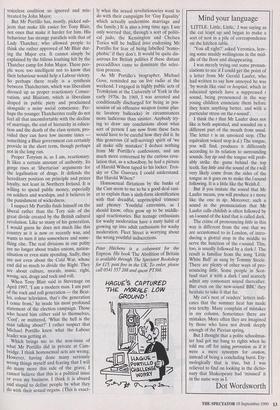Mind your language
`LITTLE. Little. Little,' I was saying as the cat leapt up and began to make a sort of nest in a pile of correspondence on the kitchen table.
`You all right?' asked Veronica, leav- ing some muddy wellingtons in the mid- dle of the floor and disappearing.
I was merely trying out some pronun- ciations to see if I could get the point of a letter from Mr Gerald Laufer, who had written to say how annoyed he was `by words like vital or hospital, which in educated speech have a suppressed t sound, being pronounced in the way young children enunciate them before they learn anything better, and with a particular stress on the t-sound'.
I think the t that Mr Laufer does not like is both aspirated, and sounded on a different part of the mouth from usual. The letter t is an unvoiced stop. (The equivalent voiced stop is d.) The tongue, you will find, produces it differently according to its relation to surrounding sounds. Say tip and the tongue will prob- ably strike the gums behind the top teeth. Say little and the sound of the t will very likely come from the sides of the tongue as it goes on to make the 1-sound following. It is a little like the Welsh 11.
But if you imitate the sound that Mr Laufer means, you will produce a t more like the one hi tip. Moreover, such a sound in the pronunciation that Mr Laufer calls childish is often followed by an /-sound of the kind that is called dark.
The crime of pronouncing little in this way is different from the one that we are accustomed to in London, of intro- ducing a glottal stop in the middle to serve the function of the t-sound. This, too, is usually followed by a dark 1. The result is familiar from the song 'Little White Bull' as sung by Tommy Steele. There are plenty of other ways of pro- nouncing little. Some people in Scot- land start it with a dark I and scarcely admit any consonant sound thereafter. But even on the new-sound BBC they hesitate to take it that far.
My cat's nest of readers' letters indi- cates that the summer heat has made you tetchy. Many complain of mistakes in my column. Sometimes there are mistakes. More often they are imagined by those who have not drunk deeply enough of the Pierian spring.
But I thought that a polite schoolmas- ter had got me bang to rights when he told me off for using peroration as if it were a mere synonym for oration, instead of being a concluding burst. Ety- mologically that is true, but I was relieved to find on looking in the dictio- nary that Shakespeare had 'misused' it in the same way as I.
Dot Wordsworth


























































































 Previous page
Previous page